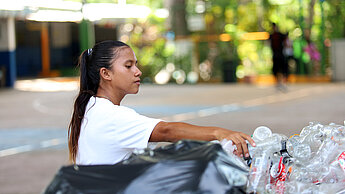Recycling protects the community
Zuleyma, 18, lives in the coastal area of La Libertad in El Salvador. In a country where land elevation is typically less than 10 metres above sea level, Zuleyma’s community is especially susceptible to flooding, as it sits next to an estuary.
Beyond geography, Zuleyma points out, there’s a second culprit in the flooding that has nothing to do with Mother Nature: “When the mouth of the estuary fills up completely with water, the water overflows into the community,” she explains. “It does this because so much trash and leaves clog things up, giving the water no other way out.”
Together with several of her classmates, Zuleyma is leading a recycling initiative. Working with other community members, her tireless team has collected over three tons of plastic and cans from the river and sold them to recycling companies. In addition to helping prevent flooding, they also prevent rubbish from ending up in the sea.
Calling herself “a leader and a collaborator,” Zuleyma takes her role seriously. When she’s not collecting waste, Zuleyma is encouraging her friends and neighbours to join her in protecting their community and environment.


